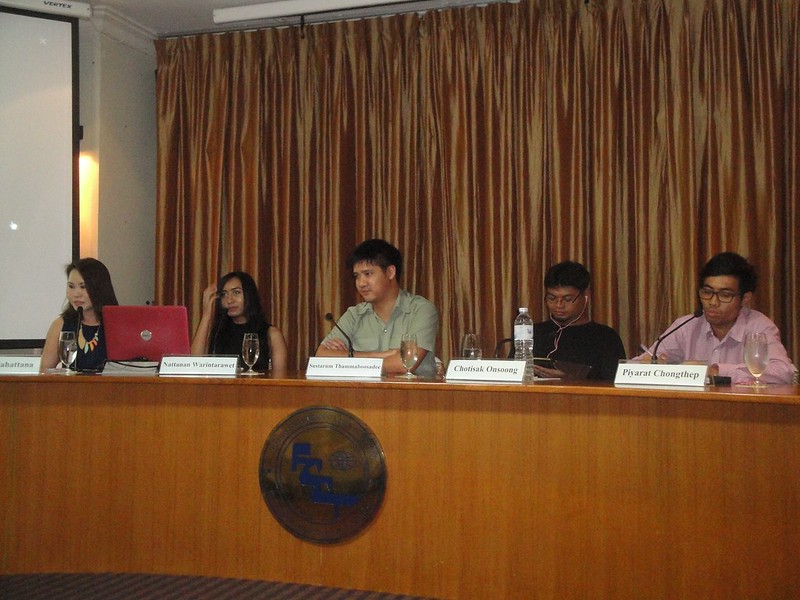Amid grim hope, student activists representing various groups have argued civil society can still take concrete steps towards repealing Thailand’s new constitution, even if the amendment process will be hard.
At a public panel convened at the Foreign Correspondents’ Club of Thailand on Tuesday, 23 August 2016, former and current student activists grimly acknowledged that the junta will likely remain in power for the near future.
The junta-sponsored draft constitution that was recently approved by a controversial referendum is viewed by many as entrenching military rule, through authoritarian reserves such an appointed senate and a new election system likely to weaken large political parties.

Penalists of the discussion on the future of Thai democracy under the new constitution at the FCCT, Bangkok, on 23 August 2016. From right to left, Piyarat Chongthep, Chotisak Onsoong and Sustarum Thammaboosadee
According to Sustarum, some previous juntas such as that of 2006 under General Surayud Chulanont were concerned with short-term rule and the protection of the monarchy. But the current regime may be motivated by a more lasting desire to prevent democracy from ever taking roots.
“We cannot compare the current regime to 2006 where the military government stayed for only one year. [The current government] does not trust democracy,” said Sustarum.
Piyarat Chongthep, or Toto, the President of the For Friends Association, took Sustarum’s argument further by concluding that the difficulty of amending the draft charter through legal channels leaves no choice but mass protest.
“I invite you to look at the new monster about to be born from the ashes of what the common people believe is a dying fire. I don’t believe that the situation will be better. On the other hand, I fully believe that violence is waiting before us,” Piyarat pointed out.
An appointed senate will make nearly impossible the approval from one-third of all senators needed to amend the constitution, on top of other requirements such as support from one half of all MPs and senators and approval from at least 20 percent of MPs who do not hold any cabinet seats. The Constitutional Court also holds binding powers to reject constitutional amendments if petitioned by Senators and MPs.
Toto, who was recently arrested for tearing his referendum ballot in protest, concluded, ‘For us to amend the constitution, one-third of senators must agree with the amendment. We will have to find another way, and it will not be a legal way’.
Yet all panellists maintained that hope is not lost either.
Chotisak Onsoong, an activist from the Iskra Group, argued that a consensus from major political parties in favour of constitutional amendment during the next election would place significant pressure on the junta to consider the charter’s repeal.
In the pre-referendum period, both Pheu Thai and the Democrat Party did encourage their supporters to ‘vote no’.
“What the democratic side must do together is pressure our political parties. Not only must each party’s policies include constitutional amendment to make it democratic, but after the election they must follow through on their promises,” said Chotisak. “We must also pressure the senators (the first group will be hand-picked by the NCPO themselves), who are crucial for a successful constitution amendment.”
Sustarum argued further that the conditions under which civil society operates are changing in favour of activists. Since the constitution was rejected in the northeast and the deep south, an incoming military government would operate under ‘uneasy conditions’ of potential unrest.
Mass protests by both red and yellow shirts in 2006 and 2013 have also demonstrated that mass mobilisation remains a viable channel for people to express discontent, Sustarum noted. He pointed out further that civil society has a longer history in Thailand than in neighbouring countries such as Myanmar, which is itself democratising.
For Sustarum, regardless of the referendum’s result, civil society always has the right to “reject the referendum and criticise the referendum…No matter whether the military governments listens to us or not, we still have the right…The military can never control everything 100 per cent”.

